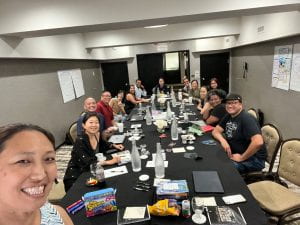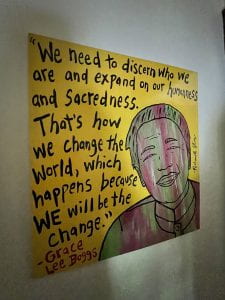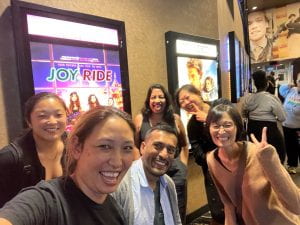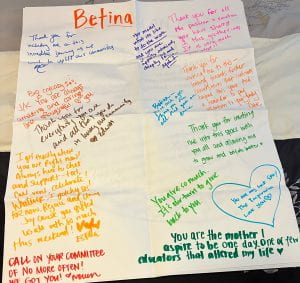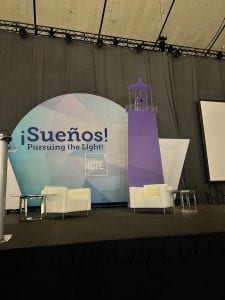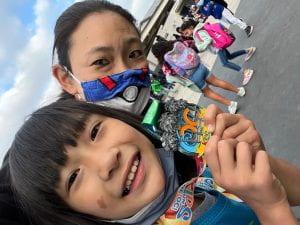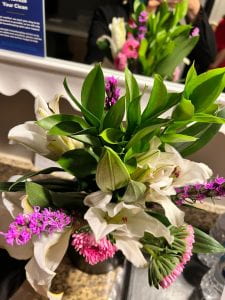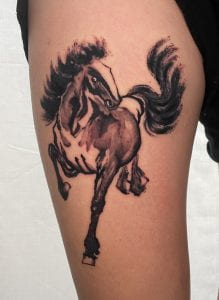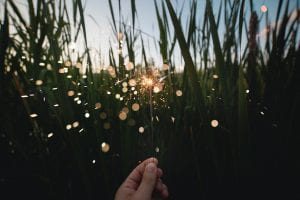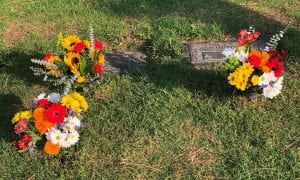Sometimes imposter syndrome (and scarcity syndrome) is (are) real, bred by isolation within a society that encourages competition and comparison, that wants to gives rise to hyper productive doer drones who operate within mindsets of never being/having/doing enough. Sometimes one can (I can, we can) feel like we’re not doing enough or we’re doing things that we have no right to do because who are we to do such things? Sometimes, because we privilege knowledge over inquiry, within a world where absolute truths (even when they are half-lies) are definitive and exploration seems flighty, we miss out on the exact community we seek and need to work and walk towards a better world.
I am in a time of transition, a time that can be both about openings and possibilities, and about fear and imposter syndrome, sometimes in rapid succession or all at once.
Eight days ago, I arrived in Detroit, Michigan, preparing to host the “Moments & Movements: Challenging Asian American Invisibility in Racial Justice in K-12 Education” institute, part of a conference grant and work that began over 18 months ago through conversations with a small group of fellow Asian American (teacher/higher) education scholars, and continued in deep partnership with my dear friend and colleague, Dr. Roland Sintos Coloma, at Wayne State University, just a few blocks from where our institute was held.
The epigraph that begins our Spencer grant proposal is by Grace Lee Boggs, a Chinese American Detroit community activist whose work was grounded in solidarity and liberation:
“We ask ourselves what it means to be human, how do we know reality? What a wonderful gift to be able to talk with one another.
Conversation is a wonderful gift and not to be replaced with speakerphones or emails that are so unilateral and not mutual….
I want people to ask themselves and each other what time it is on the clock of the world.”
Time for conversation is indeed a wonderful gift. Time to come together, in person, to be grounded in the identities, communities, contexts, and purpose that drives our work for three days is a wonderful gift. Time to build relationship, to be fully human, and to attend to our bodies and minds, is a wonderful gift.
I came into the institute scattered, wondering who I was to be “leading” this work. After administrating for a year, my work with Asian American teachers and students felt far away from my everyday consciousness. Being pulled in many different directions with little time to rest, to pause, to be in my day-to-day life, had made me question if I could really be present to this wonderful group of scholar-educators we had assembled.
A few weeks before, in meeting with our amazing advisory board, Roland and I had been reminded to focus on the uniqueness of the space, to open up time for conversation, to not drive towards products, but to bask in the process of becoming, of building community rather than one more initiative, of supporting one another’s work. We each came from different contexts, were up to different things, and were at unique moments and movement spaces in our own lives.
We embraced this, and made space to share, to listen, and to support. We began with a community dinner at a local restaurant, our first chance to build community together. Breaking bread together, getting to know each other better as people, (re)connecting with friends across the country, set the tone for our time together.
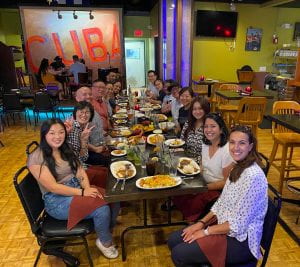 The next morning, we moved through deeper introductions, considering our work, our identities, our contexts, and our goals for the institute. It was beautiful to hear what each person was up to, but even more than that, the resonance of themes of isolation, of not feeling __________ enough, of our continuing work, for ourselves, and in communities where place and identities were constantly shifting, of transition, it reminded me that I was not alone, that I was indeed enough, and that we were a community.
The next morning, we moved through deeper introductions, considering our work, our identities, our contexts, and our goals for the institute. It was beautiful to hear what each person was up to, but even more than that, the resonance of themes of isolation, of not feeling __________ enough, of our continuing work, for ourselves, and in communities where place and identities were constantly shifting, of transition, it reminded me that I was not alone, that I was indeed enough, and that we were a community.
We took time that afternoon to pay honor and homage to the space we were in. I appreciated the call in and reminder to acknowledge the indigenous lands we were on by Mohit (who also led daily restorative/yin/light active yoga to make sure we had the opportunity to be centered in our bodies each morning). I was also grateful for the time to consider the death of Vincent Chin and Lily Chin’s struggle for justice following her son’s death which was a pivotal moment in the Asian American movement. I was humbled to learn more about the community-grounded, solidarity-based justice work of Jimmy and Grace Lee Boggs, to visit the Boggs Center and Boggs School, and to see the ongoing legacy and justice work that continues even as the Boggs have transitioned to be ancestors. It was also a gift to hear about Grace Lee Boggs’s humanity from our tour guide, Soh Suzuki, Grace’s former housemate (and beer runner).
Coming from a space where I am surrounded by numerous and diverse Asian American communities, being in Detroit, where Asian Americans only make up 1% of the city’s population, and where Hmong and Bengali communities predominantly make up that 1%, it caused me to pause and reflect, as we learned about push out, migration, and flight of Asian Americans from the city. Context and communities shape who we are, how we move, and the stories we have access to.
Our next day, we picked up conversations from the prior day to reflect on how we look out for and support one another, building networks across our networks, and participating in sharing roundtables that considered: purpose & power, context, content, and practice. These were rich conversations that brought new perspectives to the work we’ve been engaging in.
We then had space to do what we needed to do: work individually, collaboratively, connect within the group, take care of ourselves and our families, be more grounded in the space we were in. This open space was grounded in trust of ourselves to know how to best use the time, and trust of each other, continuing to build upon the conversations we had during the previously 36 hours.
Jung told me to nap, so I did, briefly, and then we got to work together, outlining our next book together and pulling together a conference proposal. It was a reminder to me that we have to take care of ourselves and our bodies first (and listen to call-ins when people see the fatigue that we’re used to constantly pushing through) and that the work of our heart will get done (in community). It was a reminder that I’m not alone in the work, that I don’t have to do it all, and that my people have my back.
That night, a few of us went to see Joy Ride, which was pure joy and another layer of community. At dinner before the movie, Lisa asked why we went into teacher education at the university level, or professor-ing more generally. This was both a rich conversation and a moment of reflection, as I considered what it meant to leave behind my middle school classroom and a community I loved deeply for the work I currently do in teacher education, and how I’ve built another community I love deeply, but not perhaps in the way I expected.
Our final morning together, we discussed what we mean when we say Asian American Studies and what distinguishes Asian American Studies from Asian American Multiculturalism. Just as the term Asian American studies is evolving, contested, contentious, continually process-driven and context centered, and fluid (and many other things…), so our conversation was. It pushed us to consider and reconsider our ideas about multiculturalism, access, and who defines/ how we define the bounds of Asian/ American success, inclusion, and identities.
We ended with acknowledgments, writing notes to one another on large chart papers to take with us (in photo or in actual) to remind us of one another, of ourselves, and that we are seen and cared for.
It has taken me a few days of being home to write this post. Our time together, though brief, was transformative. It was a reminder that when we “move at the speed of trust” as adrienne maree brown calls us to do, we can move mountains, within us and in the world. It also reminded me that sometimes stillness rather than movement is our call in a moment. Sometimes, it is enough just to be, and it is the most important thing, particularly in times of transition.
I am committed to creating more spaces like these: humanizing spaces for educators to be and to be in community with one another, vulnerable spaces where we can bring our whole selves without the need to posture or prove our worthiness, spaces that encourage rest and restoration, spaces where we can hold one another and allow ourselves to be held. This is the work. Everything else will come when we come from a place of wholeness.

